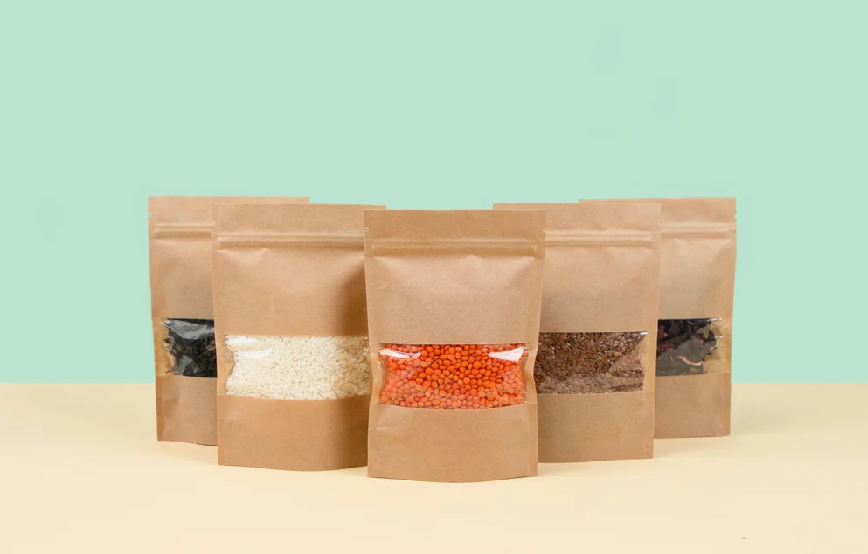Introduction
In the realm of modern packaging solutions, flexible packaging has emerged as a versatile and efficient option for industries worldwide. Its adaptability, lightweight nature, and cost-effectiveness have made it a preferred choice for various products, ranging from food and beverages to pharmaceuticals and consumer goods. The world of manufacturing flexible packaging, explores the suppliers driving innovation, the manufacturing processes involved, and the significance of paper bag wholesale suppliers in the market.
The Rise of Flexible Packaging
Flexible packaging has witnessed a remarkable rise in popularity over the years, owing to its numerous advantages over traditional rigid packaging formats. Its lightweight construction reduces transportation costs and environmental impact, while its flexibility allows for efficient storage and handling. Additionally, flexible packaging offers superior barrier properties, prolonging the shelf life of perishable goods and ensuring product integrity.
Understanding Flexible Packaging Suppliers
Flexible packaging suppliers play a crucial role in meeting the diverse needs of industries worldwide. These suppliers specialize in the production of a wide range of flexible packaging materials, including films, pouches, and bags. They utilize advanced manufacturing technologies to ensure high-quality products that meet stringent safety and regulatory standards.
Key Players in the Flexible Packaging Industry
Several key players dominate the flexible packaging market, leveraging their expertise and innovation to cater to various sectors. Sealed Air Corporation is renowned for its extensive product portfolio and global presence. These industry leaders continually invest in research and development to introduce new materials and technologies, driving advancements in flexible packaging solutions.
Specialized Suppliers and Niche Markets
In addition to major players, the flexible packaging industry comprises numerous specialized suppliers catering to niche markets and specific product requirements. These suppliers often focus on customized solutions, offering tailored packaging designs, printing capabilities, and sustainable alternatives. From biodegradable films to compostable pouches, these niche suppliers contribute to the industry’s diversity and innovation.
Manufacturing Processes of Flexible Packaging
The manufacturing of flexible packaging involves a series of intricate processes aimed at transforming raw materials into finished products. From extrusion and printing to lamination and conversion, each step requires precision and expertise to ensure optimal performance and quality.
Extrusion
Extrusion serves as the foundation of flexible packaging production, involving the melting and shaping of polymer resins into thin films. This process allows manufacturers to control various properties such as thickness, strength, and barrier performance. Advanced extrusion technologies enable the production of multilayer films with enhanced functionalities, including moisture resistance and oxygen barrier.
Printing and Lamination
Printing plays a vital role in enhancing the visual appeal of flexible packaging, allowing for vibrant graphics, branding elements, and product information. Common printing techniques include flexography, gravure, and digital printing, each offering distinct advantages in terms of speed, precision, and cost-effectiveness. Following printing, lamination combines multiple layers of films with adhesives to create composite structures with enhanced properties such as strength, durability, and barrier performance.
Conversion and Finishing
Conversion processes involve shaping and sealing the laminated films into various packaging formats, including pouches, bags, and sachets. Techniques such as heat sealing, cold sealing, and ultrasonic sealing are employed to create secure and tamper-evident closures. Additional finishing processes, such as slitting, cutting, and perforation, further customize the packaging to meet specific customer requirements.
The Role of Paper Bag Wholesale Suppliers
While flexible packaging dominates many sectors, paper bags continue to hold significance, particularly in industries prioritizing sustainability and eco-friendliness. Paper bag wholesale suppliers cater to businesses seeking environmentally responsible packaging solutions, offering a wide range of options, including shopping bags, carryout bags, and gift bags.
Sustainable Packaging Solutions
Paper bag wholesale suppliers play a crucial role in promoting sustainability by offering paper-based packaging alternatives to plastic. Recycled materials, biodegradable coatings, and Forest Stewardship Council (FSC) certified paper are among the environmentally friendly options available. These suppliers collaborate with businesses to develop customized solutions that align with their sustainability goals while maintaining functionality and brand image.
Customization and Branding
In addition to sustainability, paper bags offer opportunities for branding and customization, allowing businesses to showcase their logos, slogans, and designs. Paper bag wholesale suppliers provide printing and customization services, enabling businesses to create unique packaging that reflects their brand identity and enhances customer experience.
Innovations and Emerging Trends
As the demand for sustainable packaging solutions grows, the flexible packaging industry is witnessing a surge in innovations and emerging trends. From recyclable and compostable materials to smart packaging technologies, manufacturers are exploring new avenues to reduce environmental impact and enhance product functionality.
Sustainable Materials
One of the most significant trends in flexible packaging is the adoption of sustainable materials derived from renewable sources. Biopolymers, such as PLA (polylactic acid) and PHA (polyhydroxyalkanoates), offer biodegradable alternatives to traditional petroleum-based plastics. Additionally, advancements in recycling technologies enable the production of recycled content films, further reducing the reliance on virgin materials.
Smart Packaging Solutions
The integration of smart packaging technologies is another emerging trend reshaping the flexible packaging landscape. RFID (radio-frequency identification), NFC (near-field communication), and QR (quick response) codes enable enhanced product traceability, authentication, and interactive consumer experiences. From intelligent sensors monitoring product freshness to augmented reality packaging engaging consumers with digital content, smart packaging solutions are driving innovation and differentiation in the market.
Challenges and Opportunities
Despite its many advantages, the flexible packaging industry faces several challenges, including regulatory compliance, supply chain disruptions, and shifting consumer preferences. However, these challenges also present opportunities for collaboration, innovation, and continuous improvement.
Regulatory Compliance
Strict regulations governing packaging materials, recycling practices, and product safety pose challenges for flexible packaging manufacturers. Compliance with regulations such as FDA (Food and Drug Administration) guidelines and EU directives requires ongoing diligence and investment in research and development. However, proactive measures, such as material testing, certification programs, and sustainability initiatives, can help manufacturers stay ahead of regulatory requirements and build trust with consumers.
Supply Chain Resilience
The COVID-19 pandemic highlighted the importance of supply chain resilience in the flexible packaging industry. Disruptions in raw material availability, transportation, and labor posed significant challenges for manufacturers worldwide. Moving forward, investments in digitalization, automation, and diversification of suppliers can enhance supply chain agility and mitigate risks associated with future disruptions.
Conclusion
Flexible packaging continues to revolutionize the packaging industry, offering unparalleled versatility, functionality, and sustainability. With a diverse array of suppliers driving innovation and manufacturing processes evolving to meet changing demands, the future of flexible packaging appears promising. Whether it’s major corporations leading the way with cutting-edge technologies or specialized suppliers catering to niche markets, the collective efforts of industry stakeholders are shaping a dynamic landscape where packaging meets the needs of today’s businesses and consumers alike.





